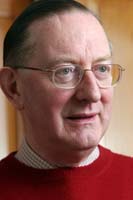Barry Swift
Training for accountancy in the 1950s Barry Swift © Carl Rose Barry Swift has lived in Burngreave for most of his life. In this sound clip he describes how he became an accountant. This sound clip lasts for 3 minutes and 40 seconds. I didn't intend to go to university...I was set, and this is all that had been suggested to me, cause I was...very much into...keeping records and figures and mathematical things, that I should be an accountant...I don't think I ever considered anything else. And at the last minute I decided to go to university to do accountancy, which in the 1950s was almost unheard of, all accountants went straight into the, their jobs, into articles, and I in fact signed articles before I went to university. And I did six years articles, three of which I was working in the office. Can you explain what you mean to listeners, what you mean by articles? Articles, yes. It, it was a legal document that my Father had to sign and I had to sign with the principle of the Firm, saying that I would work for six years, in my case, for them - I still have the document upstairs - it has a red seal on it, making it legally enforceable. I actually signed for the princely sum of receiving ten pounds a month through the whole of my articles. They were a little more generous than that, I was earning a little bit more by the end of the, the time, but not a lot. The other change apart from the fact that the accountancy profession didn't like university entrants, they like them straight from school, and I remember a very severe sort of gentleman, who I thought was elderly, but was probably only in his forties, saying, 'You'll find it terribly difficult if you go to university. You'll never get through the exams...' and I was very pleased at the end to get through my exams first time. So I qualified as a chartered accountant in 1962. I then went, because it had been my aim to work for the family firm, my Father had said there would was no way he would countenance it unless I had some qualification, for which I am eternally thankful to him, because the firm, my Father died two years after I was qualified, two years after I was married, and fairly typically of family businesses, there were outside shareholders who caused trouble and it was sold two years later. And although I stayed on, I was, it clearly had no future, there was no future in the job. And I went back into the profession and then spent the next thirty-five years...working in a professional office of chartered accountants, and for the last but all two of those, I was specialising in taxation, taxation of individuals then later on of companies, taxation of international groups, at one stage. So that's my sort of professional and home background. Extract from an oral history interview with Barry Swift recorded by Jill Whitfield for the Burngreave Voices oral history archive, January 2006. |
